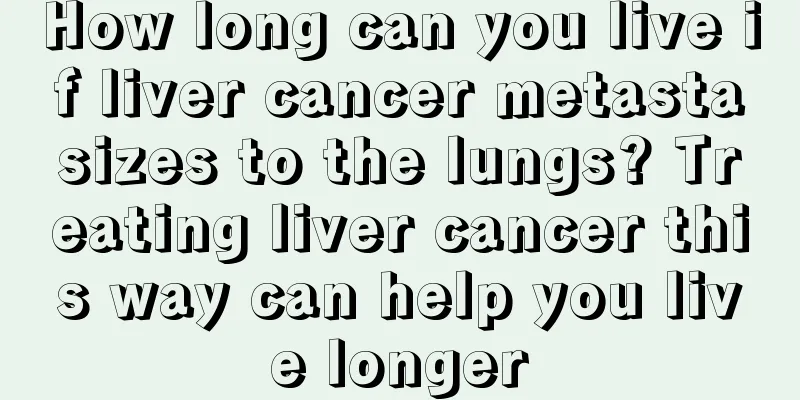Which diseases are easily confused with colon cancer

|
What diseases are easily confused with colorectal cancer? Colorectal cancer is a cancer-like disease that occurs in the intestines. It is more common in men, and most colorectal cancer patients are over 40 years old. Because many people do not know much about colorectal cancer, there are some misunderstandings about colorectal cancer, which delays the timely treatment of colorectal cancer. It is understood that people often confuse colorectal cancer with other diseases. What diseases can easily be confused with bowel cancer? According to a survey, about 30% to 40% of colorectal cancer patients are misdiagnosed due to the negligence of doctors and patients themselves. There are several diseases whose symptoms are easily confused with colorectal cancer, such as hemorrhoids, anal fissures, intestinal polyps, dysentery, gastric ulcers, colitis, etc. They are easily confused with colorectal cancer because of blood in the stool, causing confusion. Among them, 50% of rectal cancer patients are misdiagnosed as hemorrhoids in the early stage. Although both cases involve blood in the stool, there are actually some differences. Patients with colorectal cancer will have abdominal distension and pain due to intestinal obstruction. When the tumor ruptures, the stool will contain pus and blood, and the stool and blood will be mixed. However, the stool of patients with hemorrhoids, anal fissures, and intestinal polyps is not mixed with blood, but attached to the surface of the stool, and the blood is bright red or relatively fresh. The stool of patients with gastric ulcers is significantly different from that of patients with enteritis. They often pass black or tarry stools. In addition to the different stools, the accompanying symptoms are also different. While colorectal cancer patients excrete mucus, thick blood in their stools, their bowel habits change, with diarrhea and constipation at times. This is because the growth of the tumor affects the normal physiological function of the intestine, causing spasms and contractions. Patients with hemorrhoids will have protrusions in their anus during bowel movements. People with anal fissures will have anal pain during bowel movements, while patients with intestinal polyps will not have abdominal pain. Patients with dysentery will have a fever, abdominal pain, and tenesmus, meaning they feel like they have a bowel movement and are anxious to go to the toilet, but always feel like they can't finish their bowel movements. Patients with ulcers will have long-term, periodic pain in the upper abdomen and frequent belching, acid reflux, and nausea. Vomit.Through the above explanation, we know which diseases are easily confused with colorectal cancer. I believe everyone has a certain understanding of colorectal cancer. If you have symptoms suspected of colorectal cancer, you must go to a relevant regular hospital for diagnosis and treatment in time. I hope this article can help you or your friends. This article is for reference only. If you have other questions about colorectal cancer, please consult our experts online. Colon cancer http://www..com.cn/zhongliu/ca/ |
<<: Experts tell you: What are the early symptoms of colon cancer?
>>: How should we prevent the occurrence of colorectal cancer?
Recommend
Is moxibustion effective for hemorrhoids
Moxibustion is a special method of treating disea...
What are the treatments for esophageal tumors?
Currently, more and more people are suffering fro...
What eyebrow pencil is waterproof for swimming
Summer is really hot, so many friends choose to s...
What are the symptoms of wisdom tooth inflammation?
Wisdom teeth are a relatively important component...
Can calcium supplementation during adolescence help you grow taller?
Puberty is the first important period of a child&...
Eye drops to restore vision_eye drops to restore vision_myopia eye drops to restore vision
In life, many young people often read books, and ...
What are the typical symptoms of canthal malignant melanoma
What are the typical symptoms of canthal malignan...
Is aplastic anemia leukemia? It turns out to be like this
Is aplastic anemia leukemia? This problem has alw...
How to reduce swelling after being stung by a bee on the neck
Speaking of bee stings, I believe that many peopl...
Trisomy 16
Chromosome 16 trisomy is mostly caused by environ...
There are mainly several methods of interventional treatment for liver cancer. Patients with this type of liver cancer should use interventional treatment with caution.
In our daily work, most of our interventional tre...
What are some tips for removing eye bags?
Many friends who often stay up late will definite...
The hazards of home cold light whitening devices
Skin whitening has always been a concern for ever...
Bladder cancer is a heritable mutation
Bladder cancer is a heritable mutation: Bladder c...
Can Nengdan Hemorrhoid Cream treat hemorrhoids?
Hemorrhoids are a disease that troubles many peop...









